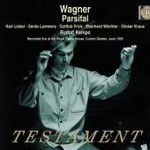
Parsifal (complete opera) (Recorded live at the Royal Opera House, Covent Garden, London, 16 June 1959)
 $90.00
Out of Stock
$90.00
Out of Stock6+ weeks add to cart
WAGNER
Parsifal (complete opera) (Recorded live at the Royal Opera House, Covent Garden, London, 16 June 1959)
Gottlob Frick, Gerda Lammers, Eberhard Waechter, Karl Liebl, Forbes Robinson / Covent Garden Orchestra & Chorus / Rudolf Kempe
[ Testament / 4 CD Box Set ]
Release Date: Saturday 30 January 2010
This item is currently out of stock. It may take 6 or more weeks to obtain from when you place your order as this is a specialist product.
Recorded live at the Royal Opera House, Covent Garden, London, 16 June 1959
Wagner's last music-drama, Parsifal, was performed at Covent Garden for the first time after the Second World War in 1951, conducted by the Music Director Karl Rankl, and with Kirsten Flagstad as Kundry and Ludwig Weber as Gurnemanz, among a distinguished but not invariably suitable cast, and in the same production as its first performance in the house, in 1914. It is worth remembering that in the late forties there was no recording of the complete work available, though there had been substantial excerpts, including an almost complete Act III, under the great Parsifal conductor Karl Muck, that had been in the catalogue since 1928. Nonetheless, the opera still had a reputation, separate from Wagner's other works, of being pretentious, religiose and above all, slow. Then in 1952 Decca published a complete recording made at performances given the year before at the reopening of the Bayreuth Festival under Hans Knappertsbusch, the successor to Muck as Parsifal conductor-in-chief: he conducted it 55 times in Bayreuth between 1951 and 1964, the year before he died. That recording made an immense impression, partly because the sound was so staggering, the acoustics of the Festspielhaus having been caught wonderfully well by the Decca recording crew and partly because, listened to at home, and with the text in the booklet that Decca sold separately, Parsifal revealed itself to many sceptics as a work of overwhelming beauty, depth and humanity. It had long been revered by musicians, especially composers - and particularly composers who were in general opposed to Wagner and all he stood for, such as Debussy and Stravinsky - for its breathtakingly original orchestration and its harmonic boldness. But these were now revealed as being in the service of what The Record Guide described as "Wagner's last, strangest and deepest thoughts". from the booklet note - Michael Tanner, 2010